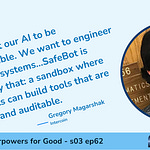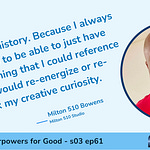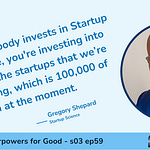Devin: What do you see as your superpower?
Moshe: I think something I have realized about myself is my power of empathy, really being able to be in the mind and heart of the person you’re speaking to when you’re talking to them or dealing with them.
Moshe Hecht, founder and CEO of Hatch, remembers working to help nonprofits reach their crowdfunding goals.
I've been through it with them when they were three months ahead of their crowdfunding campaigns and just were trying to imagine a narrative and trying to imagine the goals all the way down at the finish line when they were crying and hugging when they hit that goal. So I've been through the wringer with nonprofits.
Nonprofits struggle, he says, to get the trove of data from a successful crowdfunding campaign into their fundraising process. First, he notes, you have to get the data into your database. From there, you’ve got to add it all to your CRM.
Too often, he says, nonprofits are lucky just to get the names and emails into a single newsletter server with everyone getting the same emails. “Then they’re wondering why they’re getting a 5 percent, 10 percent unsubscribe rate,” Moshe says.
“They’re sitting on people who may have given $10, $15, $20 in that campaign, but their capacity to give could be in the millions—and they just don’t know it,” he says.
Repeatedly, over the years he served as the chief innovation officer for Charidy.com, a crowdfunding site for nonprofits, he heard people say, “I would solve this problem if only dot, dot, dot.”
Finally, he thought, “Maybe I should go and build this dot, dot, dot.”
Hatch is the dot, dot, dot.
Moshe and his Hatch team have aggregated over 300 pieces of data on “let’s just call it most people.” The data comes from public sources and includes things like giving history and analysis that yields giving capacity.
“We’re gathering information on their work, their career, their lifestyle, their social network, all information that, technically, if you would go do a ten-hour search on every individual in your database, you’d be able to find,” he says.
“We’re following all the GDPR, CCPA rules, so if someone wants to be forgotten, they go onto the site, they can delete their information,” Moshe says. “So, we’re following all the highest standards of data privacy.”
“What we’ve done at Hatch is we’ve delivered a beautiful platform where they can finally, really, for the first time for many organizations, see their people in their full light,” he says.
The tools allow nonprofit leaders to better engage a much higher proportion of the people who give, accelerating growth and driving more impact.
Throughout his career, Moshe has developed empathy as a superpower.
How to Develop Empathy As a Superpower
One of the ways that Moshe applies empathy in his work is with hiring and firing employees. He explains:
There's a common phrase in the business world, “hire slow, fire fast.” So I have a new phrase. It's called hire slow and fire slow.
You do all your due diligence before. And really, there isn't there just isn't enough due diligence before that you can do to find out what people are and how people really are. You can interview them for months. Then, within two weeks of them actually working for you, we'll learn so much more than you did.
So, but you've got to do your due diligence, you've got to do background checks, you've got to do all that. But then when the person doesn't pan out, we're so quick to, to say, well, you know, we have quotas to meet and fire fast.
Of course, in many cases, that's true. But I feel one of the things that I've learned in my eight years of hiring and even some firing is don't be so quick to fire people. Don't be so quick to get rid of them, because there is one example that really, really stands out to me.
In the beginning of my last company, there was someone who right away I felt like there's no way this guy's going to be sticking around. Then there was another executive, one of my peers said, saw something in this person and said, “No, no, no, no, you're making a mistake. You're making a mistake. I see something here.”
I didn't see it. I just really did not see it. Ultimately, after six years, he became our biggest earner. He became a real mentor to the other colleagues in the company. Eventually, he went on, got a degree, became a therapist and then started his own business.
That's probably one of the greatest lessons that that that I've learned. I think it's given me the power of empathy, the power of realizing also as a boss, the onus is on you, really, to nurture the person. Like, that's the point.
Moshe then added a checklist of questions to ask about your role as a manager concerning an underperforming employee:
Did you really do enough to nurture this person?
Are you really giving them the tools to succeed?
Are you giving them the environment where they can thrive?
“A lot of people have that potential,” he says. “If given all those stated things, they can become rock stars. They end up becoming your biggest assets.”
“It’s that power of empathy,” Moshe concludes.
If you follow Moshe’s example and advice, you can make empathy a leadership skill that becomes a superpower for good.














